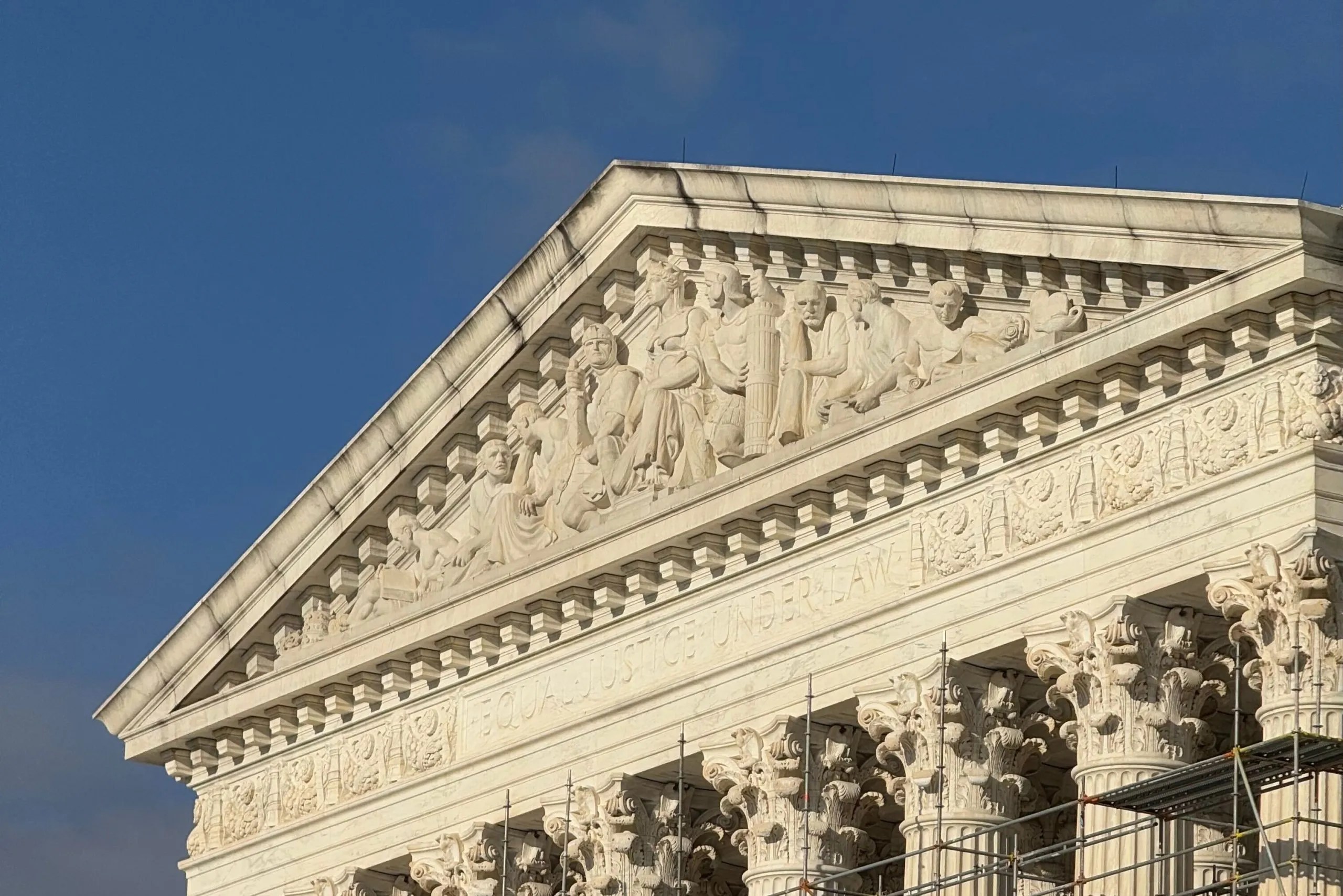SCOTUStoday for Monday, November 3


Updated on Nov. 3 at 9:22 a.m.
Welcome to the Supreme Court’s November sitting. Starting today, there will be nine arguments over the next 10 days.
SCOTUS Quick Hits
- The justices will hear argument today in two cases: Rico v. United States (on whether the fugitive-tolling doctrine applies when a defendant flees from supervised release) and Hencely v. Fluor Corporation (on whether military contractors can be held liable in tort suits brought under state law).
- SCOTUSblog will host a live blog on Wednesday during oral arguments in Learning Resources, Inc. v. Trump, in which the court will consider the legality of President Donald Trump’s tariffs. The live blog will begin at 9:30 a.m. EST and be hosted by C-SPAN. Amy Howe will be interviewed on C-SPAN before the arguments and Zachary Shemtob will be interviewed on C-SPAN after the arguments have ended.
- Also after the tariffs argument, the Advisory Opinions podcast will be available on SCOTUSblog. Host Sarah Isgur will be joined by Amy, David French, Roman Martinez, and David Lat.
- Additional briefs in Trump v. Illinois, on Trump’s authority to federalize and deploy National Guard troops in Illinois, are due by next Monday, Nov. 10.
- Former Justice Anthony Kennedy is scheduled to speak about his new memoir today at the Commonwealth Club in San Francisco.
Morning Reads
- The Debate Dividing the Supreme Court’s Liberal Justices (Jodi Kantor, The New York Times)(Paywall) — Outnumbered 6-3, the Supreme Court’s liberal wing is facing “an existential dilemma over their lack of influence,” and Justices Elena Kagan and Ketanji Brown Jackson “in particular are divided on the best approach to jobs in which they are more or less sentenced to fail,” according to The New York Times. Kagan is careful about “rocking the boat” as she works to pull conservative justices closer to the center, while Jackson “has started warning the public that the boat is sinking.” “The liberal justices feel stuck, people close to them say. All three see Mr. Trump as a threat to the constitutional order, yet no approach — diplomacy or confrontation — has persuaded the conservative center of the court to regard him that way.”
- Trump says he will not attend Supreme Court’s oral arguments on tariffs (Jasper Ward and Andrea Shalal, Reuters) — After weeks of discussing his interest in attending oral arguments, President Donald Trump on Sunday told reporters “he will not attend the Supreme Court’s upcoming oral arguments concerning the legality of his global tariffs,” according to Reuters. “I wanted to go so badly,” Trump said. “I just don’t want to do anything to deflect the importance of that decision. … I don’t want to call a lot of attention to me. It’s not about me, it’s about our country.”
- Justice Anthony Kennedy urges law students to rethink the judiciary (Daniel Xu, The Stanford Daily) — During a Thursday appearance at Stanford Law School, former Justice Anthony Kennedy “discussed his storied career and decried current politics,” according to The Stanford Daily. “It’s just horrifying for me to see on our television. How about the officials—who are in the executive branch, who are in Congress—going on television, and using vulgar, four-letter words,” Kennedy said. He also spoke about how he approached his work as a judge and his commitment to remembering that “the law affects real people.” “It is your duty, as a judge, in each and every case, to ask yourself again, why am I about to do this?” Kennedy said. “Why? You owe that to the litigants. You owe that to the judiciary. You owe that to yourself.”
- The Supreme Court justices to watch during the tariffs oral argument (The Washington Post Editorial Board)(Paywall) — Ahead of Wednesday’s argument in the tariffs case, The Washington Post Editorial Board highlighted five justices to watch during the debate: Chief Justice John Roberts and Justices Elena Kagan, Neil Gorsuch, Brett Kavanaugh, and Amy Coney Barrett. The board said that Kagan will be working “to corral her conservative colleagues on the anti-tariff side,” and that past remarks from the four conservatives on issues such as the separation of powers may be open to persuasion.
- Is Same-Sex Marriage In Danger At SCOTUS? (David Lat, Original Jurisdiction) — The justices will consider former Kentucky county clerk Kim Davis’ request to overturn the court’s 2015 ruling recognizing a constitutional right to same-sex marriage at their private conference on Friday, Nov. 7. In a post for his Substack, David Lat explored the content of the petition and why he does not believe the court will grant review. Specifically, he pointed to the fact that Davis did not challenge the 2015 ruling in the trial court and previously claimed that she didn’t want to “relitigate” that decision. But Lat said he doesn’t “rule out the possibility … of a dissent from the denial of cert by Justice Thomas or Justice Alito—more likely addressing Davis’s First Amendment defenses” to a lawsuit over her refusal to issue a marriage license to a gay couple, rather than the same-sex marriage ruling itself.
A Closer Look: Sovereign Immunity and the Federal Tort Claims Act
The Federal Tort Claims Act will be in the spotlight on Monday as the justices consider Hencely v. Fluor Corporation, a case on the extent to which military contractors can be held liable in tort suits.
For much of the country’s history, Americans had limited legal options if they were injured by the federal government. The United States – including those working on its behalf – was understood to have sovereign immunity, meaning that there would be no mechanism for successfully suing it unless Congress created one. This was because the Founders believed sovereign immunity protected the federal government from “undue judicial scrutiny” and the potential financial burden of correcting issues caused by members of the federal workforce.
Here’s one example of what sovereign immunity looked like during the Founding era: When the College of Rhode Island (now Brown University) needed to be reimbursed for damage caused to a school dorm that had been used for about six years by American and French troops from 1776 to 1782, it had to wait 18 years for the government to make payment. And when the government finally paid the College of Rhode Island, it did so by passing “a private law—an act for the relief of a specific individual or entity rather than a generally applicable public law—authorizing the Treasury Department to settle the claim,” according to the Federal Judicial Center.
Such private laws were one of two ways that organizations or individuals could overcome the government’s sovereign immunity and be reimbursed in the late 18th and early 19th centuries. The other way was to submit a claim with the Department of the Treasury, which would then, under congressional scrutiny, decide whether to pay it.
In the mid-19th century, Congress established the Court of Claims and outsourced some of the work of addressing private damages claims, which had come to take up a significant amount of lawmakers’ time. But it did not give the court the authority to hear tort claims – lawsuits seeking damages for harm to people or property caused by a federal employee’s wrongful actions or negligence. Those types of claims continued to be addressed directly and individually by Congress until the late 19th century, when Congress began allowing the Court of Claims to hear a very limited set of tort claims related to property damage and granted federal agencies the authority to resolve others (but put a fairly low cap on payouts).
As the federal government rapidly expanded in size in the early 20th century, pressure mounted for Congress to grant federal courts jurisdiction over a broader range of tort claims. Congress passed a bill that would do just that in 1929, but it “received a pocket veto from President Calvin Coolidge.” Nearly 20 years later, after the administrative system for addressing claims had been criticized publicly by President Franklin Delano Roosevelt, the Federal Tort Claims Act became law in 1946.
The Federal Tort Claims Act waives the United States’ sovereign immunity in circumstances where a government employee, if a private person, would be liable for injury, loss of property, or death in the state where the wrongful or negligent act took place. However, it includes several exceptions, or circumstances where Congress felt it was important to keep sovereign immunity and protect certain government functions from judicial interference, such as for claims “arising out of the combatant activities of the military or naval forces, or the Coast Guard, during time of war” and for claims “arising in a foreign country.”
As noted above, the Supreme Court on Monday will consider aspects of the FTCA as it hears oral arguments on Hencely. Last month, the FTCA was also at issue when the court considered United States Postal Service v. Konan, a case on whether a Texas woman can sue the USPS over intentionally undelivered mail.
SCOTUS Quote
“The main business of a lawyer is to take the romance, the mystery, the irony, the ambiguity out of everything he touches.”
On Site
Contributor Corner
Being a Justice Doesn’t Make You a Policy Expert
Andy Smarick, a senior fellow at the Manhattan Institute, reflected for SCOTUSblog on how common it has become for justices, judges, and clerks to essentially function as policymakers – and why it’s a problem. He contended that the current justices’ lack of a policy background makes them more likely to “scramble the work” of legislatures and the executive branch. “In the years ahead, as the court considers cases involving tariffs, immigration, AI, trans athletes, and religious charter schools its decisions would be far better informed if more of its members better appreciated the policies at stake and the officials and processes behind them,” Smarick wrote.
Posted in Featured, Newsletters